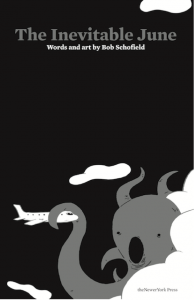 The Inevitable June
The Inevitable June
by Bob Schofield
theNewerYork Press, June 2014
144 pages / $20 Buy from theNewerYork
I think a lot about the color orange, and also about new ways of naming.
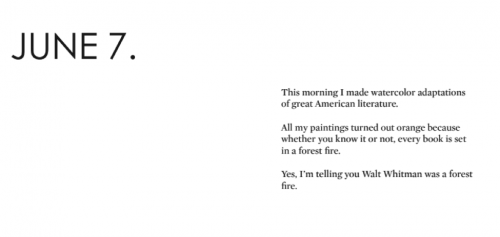
From The Inevitable June. Image courtesy of biblioklept.
Frank O’Hara thinks about orange one day. He writes pages and pages of poetry. He says in Why I am Not a Painter that “There should be / so much more, not of orange, of / words, of how terrible orange is / and life.”
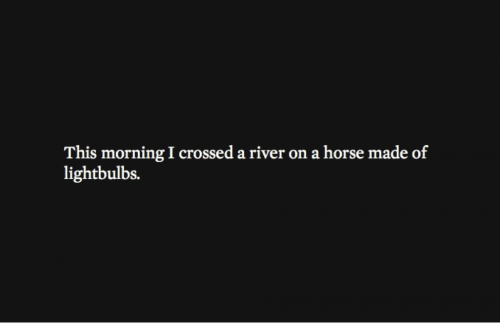
From The Inevitable June. Image courtesy of theNewerYork.
Both Schofield and O’Hara seem correct about orange. But, as his relationship to orange is meant to show, O’Hara is not a painter. Whatever you want to call The Inevitable June in terms of genre (who cares?), it’s heavy on the visual, so orange for Schofield and his narrator doesn’t serve as a line in the sand, stifling or sidestepping the visual. Instead, orange is simply something discovered to be inevitable, much like the inevitability of the old woman who kisses the narrator on the cheek on June 6. Even as ‘every book’ might not seem orange, adapting any given book to watercolor will ‘reveal’ its inevitable orangeness.
This is important, I feel: the indeterminacy or withdrawnness of Schofield’s language is anchored to the irrevocability of the narrative arc. What happens in it is what happens, both contingent and unavoidable, and the language coils around this anchor in something resembling play, or discovery, but not of anything. More a disembodied feeling whose color the reader inevitably wants to name. The visual element also explores this tension, serving both as a clean, minimal ground for the flight of imagery as well as sometimes ‘phasing’ into inscrutability with respect to its relation to the words.
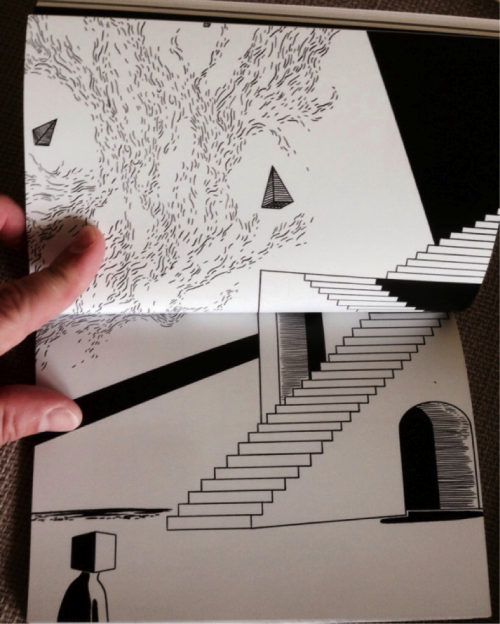
from The Inevitable June. Image courtesy of biblioklept.
It left me thinking sometimes, ‘are the words and the pictures referring to the same thing?’ Even in cases where their relation was clear, the indeterminacy of their interaction served as a productive launchpad for observing my own reactions to the text. I was reminded of this piece, for some reason:

One and Three Chairs, Joseph Kosuth (1965). Image courtesy of wikipedia.org.
The way kids are putting it is, “it is what it is.” The visual and the linguistic in this book work in wretched counterpoint, wretched or wrenching precisely because the events of the text are ‘inevitable,’ and there is no explicit center or anchor determining the relation between the words and the pictures. There is a kind of absent referent gamboling throughout the elastic spaces between the content, but every time the reader tries to look at it, this ‘essence’ changes. This is a book that likes to wiggle. Sometimes it seemed like the visual and the linguistic were ‘duking it out,’ while at other times the notion of a distinction between ‘picture of X’ and ‘word meaning X’ seemed specious.
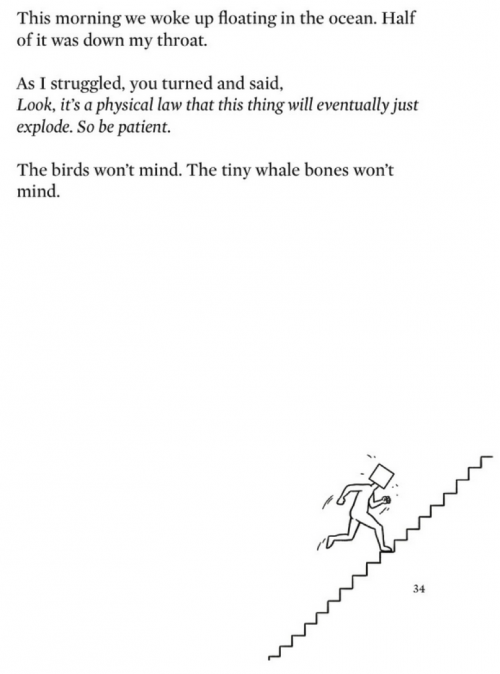
From The Inevitable June. Image courtesy of theNewerYork.
And in fact one of my favorite things about The Inevitable June is how the whole thing is an idiolect unto itself, and that knowing the order of words and images at any given reading of it doesn’t mean I can predict how the text will affect me. This kind of high ‘replay value’ is good, because each time I read this book I felt different, though the inevitable constant was marveling at its beautiful design. The glossy stock paper is a delight to the touch, inviting hands to it and beckoning unexpecting readers into its world. What lies behind the foil octopus on the cover this time?
There are a number of ways to read the book, but the primary question for me was pace. I can imagine the novelty of reading and re-reading each section of The Inevitable June on its corresponding June date, or the dedication of re-reading the text every day in June, etc. I found I most enjoyed what The Inevitable June did to me if I read through it without pausing to ogle images or ponder teasing sentences. Instead, if I kept flipping, my confusion would spring inward and create a platform to communicate with the text– something almost limbic. And at moments it felt like the narrator was the book itself, talking to me and my blooming, buzzing confusion, egging me on.
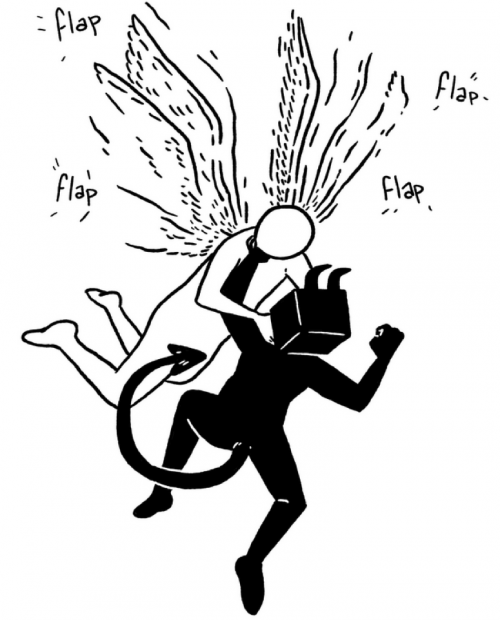
From The Inevitable June. Image courtesy of theNewerYork.
There was one reading I was just not in the mood for this book. I was like “what’s your beef with Brazil asshole?” “What do you mean you’re Stalin’s lovechild?” “Why do you try to make everything seem like an adventure?” Etc. The fluid sadness hidden behind the text shriveled away during this reading, and June’s inevitability instead became laden by my sense that “Schofield must think he’s real fucking clever.” Yet I was not bored: the book was as engrossing as other readings, but it connected with different parts of my wonder. Some wonder has teeth. It seeks to make its object flimsy. My disdain took a similar momentum to that of Bruce Andrews, for whom poems that fail to “explode the lyric ‘I’” signify simply false dissent. He used the term “progressive lit” as a pejorative for such writing.
Let’s pursue this (while remaining aware that The Inevitable June and work from theNewerYork is not poetry). Even as The Inevitable June and its linguistic-visual matrix do not do much work to explode the lyric “I,” in some senses the voice here is always-already ‘exploded’ or dismantled. At the very least, the narrator is often inscrutable to the reader. For the textual space to exacerbate this illegibility might render the work less approachable, and the barely-there cyphers of plot and character would cease to be cogent. In fact, The Inevitable June works at the opposite end of the spectrum of work that Andrews critiques: here, we don’t get the explosion of the lyric “I,” but instead the unsteady projection of an already-exploded “I,” which sometimes falters such that it doesn’t seem clear whether there even is a narrator, a coherent set of events of narrative properties, etc. In this sense, the text’s world begins from scratch every day.
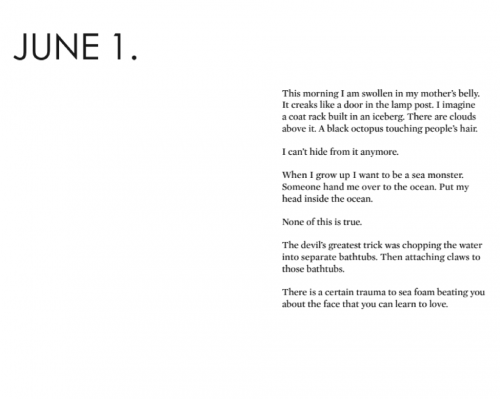
Image courtesy of biblioklept.
Perhaps to prevent absolute illegibility, the language remains paratactic and minimal, even registering as deadpan depending on my state of mind. Parataxis is sometimes used to describe texts whose elements exist with no determinable order or hierarchy. The Inevitable June does have an order– the days of June– but its inevitability does seem arbitrary to some extent, as does the relationship between words and pictures. Can these days mix and match?
June 19.
This morning I wandered the hedge maze pouring a trail of tea behind me. You were strapped to my back saying we would never escape.
Something in your voice made me believe you.
When they write our lives down in a thousand years, how long will this chapter be?
This little bit here where we crawled on top of each other and buried our front teeth in one another’s cheeks?
More importantly for some readers, is this a ‘story?’ The month structure confers narrative qualities on the text: this is a series of days, during which things happen. Does that ‘count’ as a story? This line of questions is another symptom of the book’s slipperiness. The Inevitable June doesn’t provide a way of answering these questions, but instead shows how the inevitability of asking them is part of the book’s structure. Like I said, I feel differently every time I read it, and when I try to describe it something somewhat different comes out each time. If someone were to ask me how I felt about it, I’d be reluctant to describe my response without holding the book in my hands, or looking at the pdf, aware that anything I say might be contradicted by a new feeling engendered by the text. It is this that is inevitable, the feeling of subtle, jagged vertigo the book confers on me, this matrix of questions that buoys the experience of the “words and art” of the book.
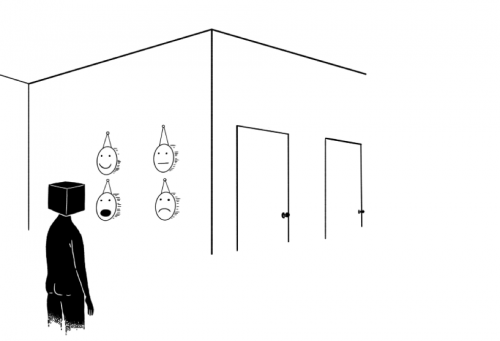
from The Inevitable June. Image courtesy of biblioklept.
I can see how such opaqueness would annoy some readers (including me sometimes), but I also often find myself marveling at how well Schofield manages to work in a traditionally-surrealist (and thus alienating) register while delivering something that still feels familiar and approachable: otherworld energy conveyed in friendly art and simple syntax. My ideal use of this text would be as a present for a tween or a person with no exposure to surrealism, L=A=N=G=U=A=G=E, and other ways of exploring the materiality of language. I can imagine this book becoming the Radiohead of experimental literature: a kind of ‘gateway drug’ into the land where meaning is a collaboration between author and reader. Clean lines, simple sentences, bumpy ride. Get psyched about it.
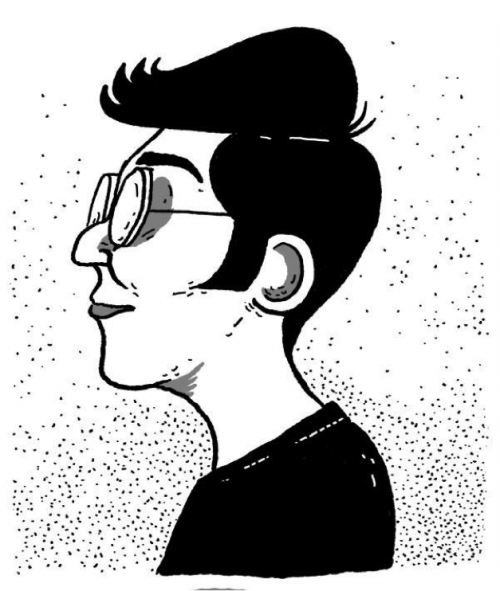
Schofield must think he’s real fucking clever.
***
manuel arturo abreu is a poet based in portland who wonders about post-minimalist linguistics, extreme cuddling sports clubs, how the air itself is an archive, and how sometimes it will rain so terribly and completely it’s like the echo got drained of Us. read more of their work here and @Deezius.
Tags: Bob Schofield, The Inevitable June

[…] In his review of The Inevitable June at HTML GIANT, Manuel Arturo Abreu wrote: “Schofield must think he’s so fucking clever.” Do you […]